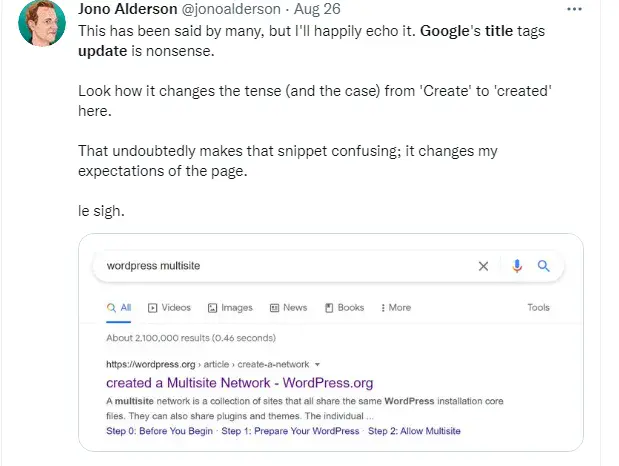Table of Contents
What is a Website Title and How to Craft the Perfect Site Title?
A title is important in any form of communication, but it’s even more important in the digital world. A good website title will help you stand out in search engine results pages (SERPs) and drive traffic to your site. Here are some tips on how to craft a great one for your site.

Website Title
How To Write The Perfect Web Title For Long-Tail Keyword Optimization?
While some titles are compelling enough to stand on their own, not every page is so fortunate. In order to optimize your page for long-tail keywords without coming off as Spammy or promotional, you might want to include them in the header tag of your title.
What is a Title Tag?
A title tag will display at the top of a browser tab and alongside any search engine results for the given webpage.
How do I know if my current Page Title needs optimization?
When composing a Page Title it’s always good practice to include important keywords that people would be using when searching online e.g “Making cake from scratch” rather than “Bakers Wine Shop”.
If viewing Google Search Results from either Firefox or Chrome there should be a number of (5-7) most relevant results and the title of your page should be listed under these. If you’re not seeing the Page Title in the search results, it is likely too general and needs to be more specific e.g “How to make cake from scratch” rather than “Bakers Wine Shop”.
Google’s Best Practices For Writing your Page Titles: Although there are no hard and fast rules for writing a good Page Title, Google provides some best practices which have been seen as a generally accepted behavior across the industry. –Use 65-75 characters including spaces e.g ‘
How To Write The Perfect Web Title For Long-Tail Keyword Optimization‘ This makes sure that all titles are displayed on a single line for mobile searches and if your website is viewed in a browser with small text.
Don’t use punctuation such as commas or dashes as these can be confusing for Google’s search algorithm. -Don’t include quote marks “like this” as Google doesn’t know what you’re searching for and could include something unrelated under your results.
Optimizing your Page Titles:
When optimizing your titles it should be done to target specific keywords that would be useful to users e.g ‘how to write page titles for SEO‘. It’s important to note that you should only optimize the first 63 characters of the Title Tag (where spaces count) and leave the remainder blank but don’t worry, even if you don’t optimize the extra space will be filled with relevant keywords e.g ‘how to write page titles for seo’.
What is a website title and why is it important
A website title is important for a number of reasons. First, the name of your site will be one of the first things people see when they come to your site. A catchy and intriguing name will make them want to explore your site more. Second, some browsers require an individual to approve cookies before they can set up an account on your site.
If people visit your site and do not like what they see, they may refuse to sign up. When you have a descriptive title that intrigues them enough, they are more likely to register with you, increasing the audience for your site. Finally, search engines show only the first few words of what you put in the search query box so having a keyword rich title will increase how often you show up in a search.

website title
How to craft the perfect website title
A good website name should be descriptive enough for people to understand exactly what your site is about, but also creative enough that it entices people to click on it. It should not be too long or too short, and it should contain keywords related to your topic.
You can generate catchy names by using negative words like “no” or “stop” (such as SnoozeStop) or positive words like “relax” (Relaxation Spot), but keep in mind that these one word names are often difficult to market and may be taken more easily by another company.
A name should be easy to remember, but it should not have an exact match with any other website. This increases the odds that when people are looking for your site in a search engine, yours will appear.
However, if two websites have very similar names, both are likely to rise in the rankings which would decrease traffic for both sites. It’s best to stay away from names that are too generic because they do not describe your business at all, or names that are trademarked so you do not infringe upon copyright laws. Lastly,
What is the purpose of the website title?
A site title is important for a number of reasons. First, the name of your site will be one of the first things people see when they come to your site. A catchy and intriguing name will make them want to explore your site more. Second, some browsers require an individual to approve cookies before they can set up an account on your site.
If people visit your site and do not like what they see, they may refuse to sign up. When you have a descriptive title that intrigues them enough, they are more likely to register with you, increasing the audience for your site. Finally, search engines show only the first few words of what you put in the search query box so having a keyword rich title will increase how often you show up in a search.
Role of website Title in SEO
One of the major roles that titles play in SEO is that they provide a more effective way for web developers to rank their site. When the title is descriptive and not just a single word, it provides an opportunity for search engines to index more keywords and rank higher than others.
The title also helps with the engagement on pages as it summarizes what the content is about. Lastly, titles play a major role in SERPs and how users interact with the content on page. The title of the site is usually what people see first and use to judge if that article or site is one they want to read or not. (website title)
Best practices of Perfect Website Title
The title of a website is one of the first things that people see. It’s often what leads them to click on your site, or to leave it for another. So it makes sense that you want your site’s title to be perfect. But how do you make sure?
It can be hard to know where best practices start and end when creating a website name, but there are some general guidelines for making sure you’re doing everything right:
1. Avoid title truncation
If you have a long title, it’s important to make sure that the search engine doesn’t truncate it so it’s not visible. You want your keyword in there so be sure to include it at the beginning of the title.
2. Make sure your keywords are included
Make sure that your keywords are included in your website name. This means that you’re including both broad and targeted keywords.
3. Make it easy to read
It is important that you make your site name easy to read for individuals who come across it. Your site should be appealing to eye with the correct fonts and spacing size available.
2. Do not use all caps.
You should not use all capital letters when creating your title.
Stick to one word per line
- If you’re writing a long title, it’s best to stick to one word per line. This will make the title easier to read and also help it rank better in SERPs.
Avoid filler words like ‘a’ or ‘an’
- Some filler words, like ‘a’ or ‘an’, can distract readers from what your site is about. Stick with more useful descriptions instead of simple words like these.
3. Write website titles for human users
Every writer, whatever their genre or topic, should be thinking about the reader. The best titles will draw readers in by appealing to their interests. For example, if you are writing an article on “how to use Twitter” then using a title like “10 Tips for Newbies” is more likely to catch the eye of someone scrolling through search results than “What is Twitter?”
Some other things to think about when crafting your site’s title are:
- Use one keyword per line
- Include your most important keywords
- Avoid filler words that may distract from your content
- Make sure you’re avoiding title truncation
- Make your keywords stand out, but make sure the title is still easy to read
- Write titles for human users.
4. Select a primary keyword to target
Selecting a primary keyword to target is one of the most important parts of SEO. This is the only way to rank well in search engine results pages otherwise your site will be lost amongst millions of others.
Best practices for selecting an appropriate primary keyword are as follows:
- Use long tail keywords
- Use one keyword per line
- Include your most important keywords
- Make sure you’re avoiding title truncation
- Make your keywords stand out, but make sure the title is still easy to read
- Write titles for human users
Conclusion for Website title
The title of your website is one of the first things that people see. It’s often what leads them to click on your site, or to leave it for another. So it makes sense that you want your site’s title to be perfect! However, how do you make sure? It can be hard to know where best practices start and end when creating a website name. (website title)
but there are some general guidelines for making sure you’re doing everything right:
- Avoid truncation if possible
- Make sure your keywords are included
- Keep titles easy-to-read
- Select an appropriate primary keyword
- Write titles for human users Google is no longer using keywords as a ranking signal, so it doesn’t feel necessary to have them included in your site name.
It’s best just to keep it short, sweet and easy-to-read.
There are also still some people following the “one word per line” rule, but that isn’t really necessary anymore either. So if you can avoid having your website name truncated then great! If not though, that’s fine too.
Just make sure to include all of the right information (primary keyword!) and make sure its easy for users to read—and there you go! You’ve created the perfect title for your website! (website title)<a href=”https://www.pingmylinks.com”>PingMyLinks.com</a> – FREE Website Submission





0 Comments